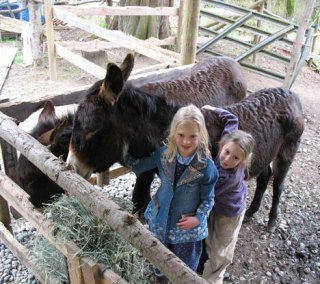When Miriam Coates got a phone call asking her to buy tickets for a donkey baseball game, she was puzzled.
A quick Internet search found her puzzlement turning quickly to anger.
“I was horrified by what I found; abusing these wonderful animals to raise money for charity is just wrong,” she said. “And there’s plenty of information from animal rights groups to back that up.”
Coates, who owns two donkeys at her home in the woods on South Whidbey, said the phone call came from the local Whidbey Eagles Aerie, which is sponsoring a donkey baseball game on June 20 at Dave Mackie Park. The money raised is used to support local charities, and is the club’s biggest fundraiser. The club charges $9 per person, or $35 for a family pass.
Jim Bring, the man who runs the operation for the Eagles, said more than $12,000 was distributed to local charities last year by the group.
Club manager Jeanne Seiler and head trustee Will Helton said that funding has gone to the M-Bar-C Ranch, Helping Hands, WAIF, Readiness-to-Learn and Meals-on-Wheels, among others.
Organizers of the event said the animals are well-cared-for, and donkeys have never been hurt or abused during the games.
Coates, though, said the event desensitizes people to the suffering of animals, and she has begun a boycott of the game in an effort to have it cancelled. She said that while raising money is a good thing, she wishes the Eagles could find another form of entertainment that doesn’t involve animal cruelty.
Suffice it to say, the game itself bears little relation to the national pastime.
At the start, seven players stand next to seven donkeys; on each base, in the outfield and at home plate. The pitcher throws, the batter hits and then mounts a donkey for the trek to first base, guided by a handler to prevent mishaps.
When a fielder gets the ball, he or she gets on a donkey and throws to the nearest base to tag the runner’s animal out. Organizers say the ball used is larger and softer than a softball and the game lasts a maximum of 90 minutes.
According to those who have tried it, the “game” quickly descends into chaos, especially as the ability to both mount and ride a donkey calls for special talents unknown to most players.
Last year Seiler decided to play after watching others try their luck.
“It was a painful experience,” she recalled. “On my first attempt, I flew over his head and landed flat on my back. But I had a great time, as did the other players and those who watched.”
Seiler added that she observed nothing wrong in the way the animals were treated.
“If I thought they were being mistreated in any way, I’d have nothing to do with it,” she said. “Neither would the Eagles.”
Coates disagrees. She said that almost every animal rights organization in the country is against donkey baseball on the grounds that it amounts to animal cruelty and that it sets a terrible example for youth.
“In donkey games, not only are animals harmed, but people have been seriously injured, too,” Coates said.
Bring, however, responded to that argument by noting that each rider signs a waiver absolving the club of legal responsibility should they be hurt. His company has a million-dollar insurance policy covering those who attend, but not players.
Bruce Wick, the owner of the company near Wenatchee that supplies the donkeys, said that no animal has ever been injured in his 29 years in the business.
“Not in transporting or during the games has a single donkey been hurt,” Wick said.
“We send a trainer along to ensure the animals are safe and treated right. There is ample water and the animals are well-fed. There is no attempt to prevent ‘accidents’ on the field of play and that’s just one of the hazards players must avoid,” he said.”
“The thing is, we want everyone to have fun and raise money for good causes,” Wick added.
Wick has 35 donkeys, some purchased or rescued, but most raised on the ranch.
“It would be unthinkable to put the donkeys I’ve raised at risk,” he said. “There is a 200-pound weight limit that is strictly enforced. We don’t just deliver the animals and come back 90 minutes later to pick ‘em up.”
Bring said he’s aware of Coates’ concerns and has invited her to the game to see for herself what transpires.
“She’s never come,” he said.
At her home, Coates pointed out the advantages of owning her two donkeys, named Chloe and Sadie.
“They are herd animals, so it made sense to have them together,” she said. “My children (Estlin, 8 and Hillel, 6) ride them, their manure is used to organically fertilize the soil and they do a great job cutting down the grass.”
Coates said that donkey baseball or its entertainment twin, donkey basketball, sets a poor example for children to see.
“The riders are inexperienced, the animals are frightened when balls are being sent in their direction and they don’t know what to do about it,” she said. “Donkey baseball is divisive to the community and I’m appalled that local charities encourage this behavior by accepting the money.
“It is quite ironic that animal welfare and anti-abuse organizations profit from such activities,” Coates said.
Jeff VanDerford can be reached at 221-5300 or jvanderford@southwhidbeyrecord.com.



